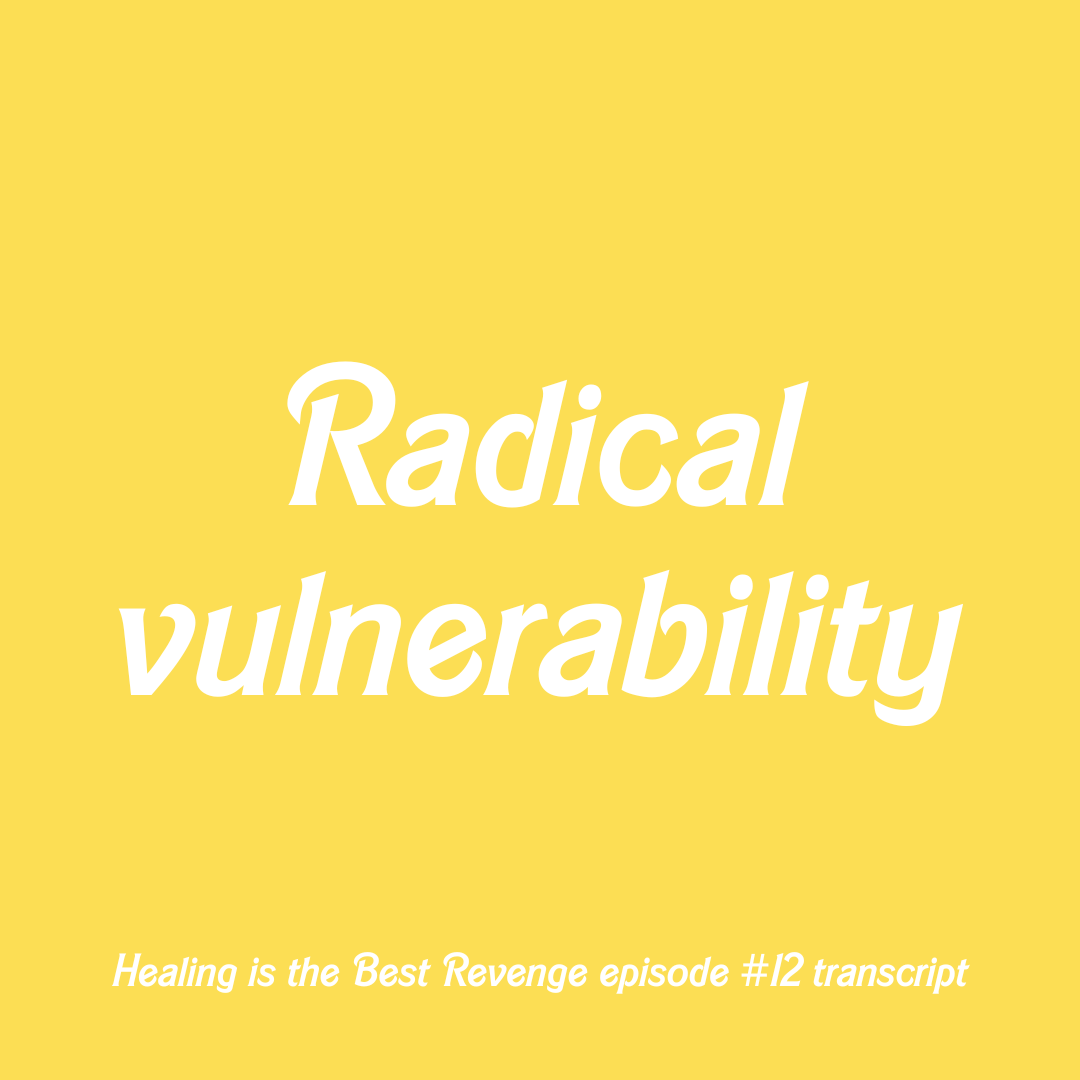Radical vulnerability | Healing is the Best Revenge episode #12 transcript
This is an episode transcript of episode #12 of my podcast, Healing is the Best Revenge.
Hi, I’m Karina Hagelin and this is Healing is the Best Revenge, a podcast for survivors and the folks who love us, to discuss the politics of survivorship, healing, and community care. This is a space where we reject pedestals & perfectionism, instead honoring the messy and complex realities of healing from trauma.
Before we start, a quick reminder that if you love this podcast, please take a moment to rate, review, and subscribe to this show. Your support means the world to me & keeps this podcast going. I really really REALLY appreciate every review and rating y’all leave.
Now, a note from this show’s sponsor: Me! The Survivor Affirmation Deck is available exclusively for preorder until October 31st.
This deck is a beautiful, inspiring, & uplifting collection of 40 vibrant affirmation cards for survivors of abuse and violence who are healing from trauma. Each colorful card features a supportive & loving affirmation for survivors, written by a survivor who gets it, has been there, and IS there. Cards feature a rainbow gradient on the back & come packaged in a lovely pink box.
The Survivor Affirmation Deck is a great gift for loved ones healing from trauma, therapists, mental health workers, folks who work with survivors of violence and abuse, and for yourself and your bestie.
I’ve put my heart and soul into creating this deck and I’m so excited to share it with you. You can find a link to purchase it in the show notes.
Now onto today’s episode!
Today, I want to talk about radical vulnerability. This is something I was exposed to through tumblr in 2011 or 2012, maybe. I recently taught a workshop to a group of 20 public library directors on this topic; I’ve also given a keynote speech about radical vulnerability to New York Public Library library workers and librarians. So, for those talks I had to be able to define what radical vulnerability is. I came up with this definition:
Radical vulnerability is all about sharing our feelings, thoughts, & experiences: the things we feel ashamed of, the events we blame ourselves for, the experiences we struggle with, as an act of healing, care, & resistance for all of us. Radical vulnerability can be a strategy for reducing stigma & shame, it can help us better understand & care for one another, &/also creates space for more of us to practice it.
Radical vulnerability is a reminder that:
We heal in the context of community, interdependently, & in relation to one another, not in isolation or independent of each other
We find support & offer support; radical vulnerability is a powerful pathway towards solidarity
We feel less alone when we share our story & in turn, so do others who resonate with it
We take up space in a way that creates space for others to do so too
We can reclaim our power; we can challenge systems of power together
So, yeah, that’s what I want to talk about today: radical vulnerability. This podcast is a practice in radical vulnerability & so are my zines & a lot of my social media + online presence.
But radical vulnerability isn’t always uplifting, inspiring, or pretty. Radical vulnerability is also messy, painful, & complicated. And personally, when I share those messy moments with people, the painful ones, the experiences & feelings that are sometimes challenging for me to even write about, I hope that folks appreciate that embodiment of radical vulnerability as much as they appreciate my radical vulnerability around the things that inspire & uplift & empower, that are aesthetically pleasing & hopeful & celebratory.
Radical vulnerability isn’t an offering for you to consume or analyze, to twist, misinterpret, and repackage. This vulnerability is for opening up difficult conversations around rape culture, trauma & mental health, for sharing solidarity with other survivors who are in the messy process of healing from violence, for crushing the stigma attached to all of these things so that we can exist without splintering ourselves further. So we can heal as a collective from a culture that normalizes abuse and pathologizes surviving it.
Okay, that’s all I’ve got for you today but before I go, if you’d like to receive notes on radical self-love, healing, & affirmations, you can find a link to subscribe to my newsletter in the show notes. I’d love to have you on the list!
Until next time, sweet friend. & as always, I believe you.

